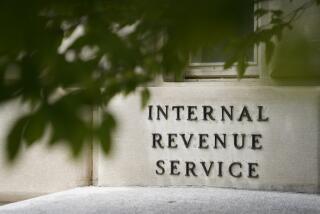Lockheed Unit Fights for IRS Computer Pact : Bidding: $1.4-billion award, part of the agency’s modernization program, went to AT&T.; But Lockheed says it’s based on a flawed analysis.
- Share via
WASHINGTON — The Internal Revenue Service has embarked on the costliest modernization effort ever undertaken by a federal agency, but the effort has been threatened by a fierce battle over which firm will handle a key computer phase of the $8-billion, 10-year overhaul.
A subsidiary of Lockheed Corp., the giant defense contractor, has gone to court to block the IRS from spending $1.4 billion to acquire 3,000 minicomputers and other high-tech equipment from the government contracting arm of AT&T.;
In a suit filed in federal court here in January, Lockheed Missiles & Space Co. charged that the IRS award of the seven-year contract contained a flawed analysis of the system’s costs and capabilities.
At the heart of the dispute is whether the IRS overlooked price as a factor in choosing its computer system and whether the agency failed to evaluate three proposals consistent with the criteria set forth in its bid proposal.
The dispute could delay parts of the long-awaited overhaul of the creaky federal tax-collection system which, when completed, will enable the IRS to more quickly and accurately respond to taxpayers’ questions and process their returns.
A blue-ribbon committee of the National Research Council last year concluded that the current system faced “a major breakdown” if not quickly overhauled.
The IRS first automated its tax return processing system in the early 1960s. The system, which relies on paper files and a magnetic-tape data storage system, remains largely unchanged today.
The contract dispute has focused attention on the complex way in which the U.S. government obtains billions of dollars in goods and services from the private sector annually. Government procurement has become particularly daunting in recent years with the array of information-processing choices made possible by computers and telecommunications.
With the White House and many federal agencies now contemplating the replacement of office equipment installed decades ago, the challenge of modernizing for the Information Age--and the risk of squandering billions of taxpayer dollars--is sure to grow.
“There remains little practical guidance,” said Frank J. Carr, a computer consultant who served as commissioner of information resources management services at the General Services Administration until 1988.
“There are so many different ways your (modernization) needs could be satisfied because there’s such great variety of computer hardware and software,” Carr added. “You can’t treat these kinds of purchases like commodities. It’s not like buying soybeans or pork bellies.”
Indeed, the IRS case recalls a similar long-running computer dispute involving the U.S. Air Force.
In November, 1991, the Air Force chose Austin-based CompuAdd Corp. and Sysorex Information Systems Inc. of Falls Church, Va., from a group of 22 bidders to supply the military with 300,000 personal computers.
But in January, 1992, a GSA board of appeals canceled the award after rivals objected on minor technical grounds. The Air Force is now awaiting a decision from the GSA on whether to approve the contract, turn it down or select another bidder.
In determining “best value” purchases, federal agencies are supposed to consider such factors as technical superiority and service capabilities--as well as price--to ensure that the government receives the best deal, officials say.
Lockheed claims in its court papers that those rules were not followed when the IRS awarded its modernization contract to AT&T; in July, 1991, over two others--Lockheed and IBM Corp. After the initial contract was awarded, Lockheed and IBM protested, claiming that the IRS evaluations were faulty and did not conform to the agency’s original bid request.
An appeals board at the GSA agreed, ordering the IRS to conduct a more thorough analysis. (The GSA manages the federal government’s property and records, including the purchase of office supplies and the operation of buildings.)
But when the IRS later reaffirmed its selection of AT&T;, the GSA board sided with the agency. IBM, whose $708-million bid was the lowest of the three, dropped its protest. But Lockheed, which submitted a bid of nearly $915 million, went to court.
Lockheed contends that even if AT&T; offers a technically superior computer system, Lockheed’s proposal was the lowest-cost bid that met the terms of the IRS’ request.
“What this case deals with is the degree to which price must be considered as a factor in awarding contracts and the extent to which an agency will be held to the (performance) criteria it publishes,” said Lockheed’s lawyer, Stuart B. Nibley. “I don’t find it credible that the IRS has such specialized (technology) needs. Its needs aren’t any more sophisticated . . . than the Defense Department’s.”
The IRS told the GSA board that it had rejected IBM’s proposal because it relied on old technology.
AT&T;’s $1.4-billion system was selected because it was state-of-the-art and provided a “greater increase” in employee productivity than did Lockheed’s proposal, IRS spokeswoman Ellen Murphy said in a telephone interview.
Lockheed’s suit is likely to be heard this spring. While the IRS has been permitted to proceed with AT&T;, lawyers says the seven-year contract could be terminated if Lockheed wins the suit.
More to Read
Inside the business of entertainment
The Wide Shot brings you news, analysis and insights on everything from streaming wars to production — and what it all means for the future.
You may occasionally receive promotional content from the Los Angeles Times.










